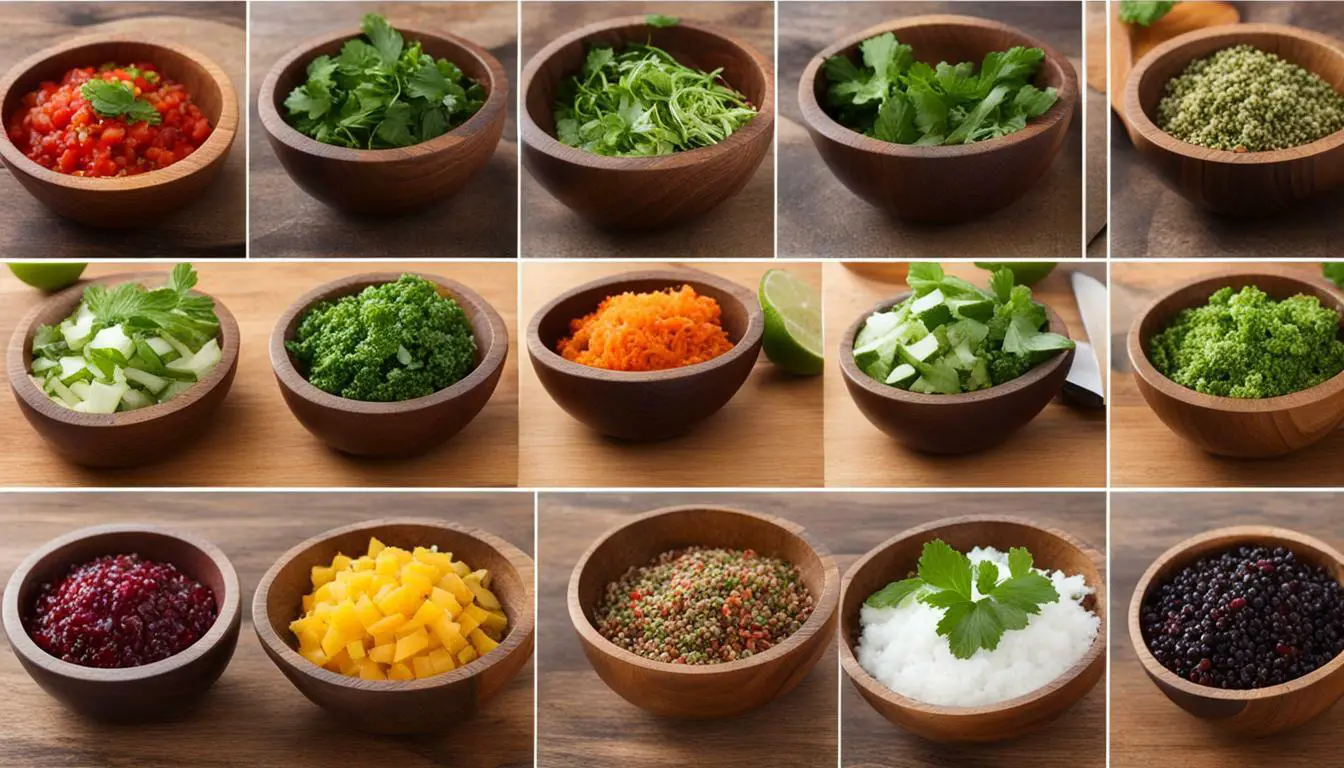
This post may contain affiliate links. Please read my disclosure for more information.
When making salsa and you don’t have vinegar on hand, there are several alternatives you can use. Lemon juice and lime juice are great options, providing a tangy flavor and vibrant color to your salsa. Apple cider vinegar can be used as a substitute with its tangy and flavorful taste. Distilled vinegar is versatile and adds a sharp, tangy flavor to dishes. You can also use wine, which adds complexity and acidity to your salsa. These substitutes can enhance the flavor of your salsa and provide delicious results.
Lemon Juice and Lime Juice
One of the best substitutes for vinegar in salsa is lemon juice and lime juice. These citrus juices not only provide a tangy flavor, but they also add a vibrant color to your salsa. The refreshing twist they bring to your recipe can elevate the overall taste profile of your salsa, making it even more enjoyable.
When using lemon juice or lime juice as a substitute, you can use them in equal amounts as vinegar. This means you don’t have to make any adjustments to your recipe. Simply swap out the vinegar with lemon juice or lime juice, and you’ll have a delicious salsa with a citrusy twist.
- Enhances flavor and provides tanginess
- Adds vibrant color to your salsa
- Use in equal amounts as vinegar
Experiment with different variations
If you want to enhance the flavors of your salsa even further, you can experiment with different variations of lemon juice and lime juice. For example, try using freshly squeezed juice instead of bottled juice. The fresh juice will have a more pronounced flavor and aroma, adding an extra kick to your salsa.
Additionally, you can mix lemon juice and lime juice together to create a unique blend. The combination of both citrus flavors can provide a balanced tanginess and bring out the best in your salsa. Don’t be afraid to get creative and find the flavor combination that suits your taste preferences.
In summary, lemon juice and lime juice are excellent substitutes for vinegar in salsa. They add a tangy flavor, vibrant color, and a refreshing twist to your recipe. Experiment with different variations to find the perfect combination for your salsa, and you’ll have a delicious dish that everyone will love.
Apple Cider Vinegar: A Tangy and Flavorful Substitute for Vinegar in Salsa
If you don’t have vinegar, apple cider vinegar makes an excellent substitute in salsa. With its tangy and flavorful taste, it can enhance the overall flavor profile of your dish. Apple cider vinegar adds a unique twist to your salsa, providing a hint of sweetness along with its tanginess.
When using apple cider vinegar as a substitute, you can use the same amount as you would use vinegar in your recipe. Its acidity and complex flavor can complement the ingredients in your salsa, creating a delicious blend of flavors.
Key Points:
- Apple cider vinegar is a tangy and flavorful substitute for vinegar in salsa.
- Use the same amount of apple cider vinegar as you would use vinegar in your recipe.
- It adds a unique twist to your salsa, providing a hint of sweetness along with its tanginess.
- Experiment with different substitutes to find the one that best suits your taste preferences.
Whether you’re looking to try something new or simply don’t have vinegar on hand, apple cider vinegar is a versatile option that can elevate the flavors of your salsa. Its tangy and sweet undertones make it a delightful addition to any salsa recipe. So go ahead, give it a try and enjoy the vibrant flavors it brings to your dish.
Distilled Vinegar: A Tangy Substitute for Vinegar in Salsa
When it comes to making salsa and you don’t have vinegar on hand, there are several alternatives you can use. Distilled vinegar can be a great substitute for vinegar in salsa, adding a tangy flavor to your dish. This versatile option complements the ingredients in your salsa, enhancing the overall taste profile.
With its sharp and tangy flavor, distilled vinegar adds a delightful zing to your salsa. Whether you’re making a classic tomato-based salsa or experimenting with unique flavor combinations, this substitute won’t disappoint. Simply use the same amount of distilled vinegar as you would use vinegar in your salsa recipe.
To incorporate distilled vinegar into your salsa, start by combining your desired ingredients. Once you have mixed everything together, add the distilled vinegar to taste. Remember, the key is to balance the flavors and acidity, so start with a small amount and adjust according to your preference.
So, the next time you find yourself without vinegar, reach for distilled vinegar. Its tangy notes will elevate your salsa to new heights, creating a vibrant and delicious dish that everyone will enjoy.
Wine: A Unique Twist in Salsa
For a unique twist, consider using wine as a substitute for vinegar in salsa. Wine can add complexity and acidity to your recipe, elevating the flavor profile of your salsa to new heights. When choosing a wine, opt for one that complements the flavors in your salsa, whether it’s a robust red wine or a crisp white wine.
Here are some key points to keep in mind when using wine as a substitute:
- Use the same amount of wine as you would vinegar in your salsa recipe.
- Experiment with different types of wine to find the flavor profile that best suits your taste preferences.
- Consider the acidity of the wine and how it harmonizes with the other ingredients in your salsa.
- Remember to use a wine that you enjoy drinking, as it will significantly impact the overall taste of your salsa.
Adding a Splash of Wine to Your Salsa
If you’re looking to add a subtle depth of flavor to your salsa, wine can be a fantastic addition. Its acidity and unique notes can enhance the existing flavors in your recipe, making each bite a delightful experience.
When substituting with wine, it’s essential to remember that different wines will produce different results. A hearty red wine, like a Cabernet Sauvignon, can bring richness and complexity to your salsa, while a crisp and fruity white wine, such as a Sauvignon Blanc, can provide a refreshing twist.
Overall, wine offers a creative and flavorful alternative to vinegar in salsa. So, why not uncork a bottle and add a splash of sophistication to your next salsa creation?
Overall Recommendation
There are several alternatives to vinegar that you can use in salsa, including lemon juice, lime juice, apple cider vinegar, distilled vinegar, and wine. These substitutes can enhance the flavor of your salsa and provide delicious results. Whether you prefer a tangy and vibrant taste or a sharp and tangy flavor, there is a substitute that will suit your preferences. Let’s explore these options in more detail:
Lemon Juice and Lime Juice
Lemon juice and lime juice are excellent substitutes for vinegar in salsa. They add a tangy flavor and bring a vibrant color to your salsa. The citrus juices provide a refreshing twist to your recipe and can be used in equal amounts as vinegar. The zesty and citrusy notes they bring will give your salsa a bright and lively taste that will surely impress your taste buds.
Apple Cider Vinegar
Another great option is apple cider vinegar, which has a similar tangy and flavorful taste as vinegar. It complements the overall flavor profile of your salsa and can be used in the same amount as vinegar in your recipe. The hint of apple flavor adds a unique and delightful twist to your salsa, making it a crowd-pleasing alternative.
Distilled Vinegar
If you’re looking for a versatile substitute, distilled vinegar is a fantastic choice. It adds a sharp and tangy flavor to your dish, perfectly complementing the ingredients in your salsa. You can replace vinegar with the same amount of distilled vinegar in your salsa recipe, ensuring a consistent taste and tanginess. With its clean and crisp flavor, distilled vinegar will elevate the flavors of your salsa.
Wine
For those who enjoy a more complex and acidic flavor, wine can be used as a substitute for vinegar in salsa. Choose a type of wine that complements the flavors in your salsa, and use it in the same amount as you would use vinegar. Experiment with different wines to find the perfect flavor profile that suits your taste. Wine brings depth and richness to your salsa, adding a sophisticated touch to your recipe.
Conclusion
In conclusion, substituting vinegar in salsa is easy with the variety of alternatives available, such as lemon juice, lime juice, apple cider vinegar, distilled vinegar, and wine. When you don’t have vinegar on hand for your salsa recipe, these substitutes can help enhance the flavors and provide delicious results.
Lemon juice and lime juice add a tangy flavor and vibrant color to your salsa, providing a refreshing twist to your recipe. Apple cider vinegar, with its tangy and flavorful taste, can be used in the same amount as vinegar to enhance the overall flavor profile of your salsa. Distilled vinegar, another versatile option, adds a sharp and tangy flavor to your dish, complementing the ingredients in your salsa.
For those looking to add complexity and acidity to their salsa, wine can be a great substitute for vinegar. Experiment with different types of wine to find the perfect flavor profile that suits your taste preferences.
When it comes to making delicious salsa without vinegar, these alternatives provide excellent options to enhance the flavors and acidity of your dish. Choose the substitute that best complements your ingredients and enjoy the delightful results.
FAQ
What are the best substitutes for vinegar in salsa?
Lemon juice, lime juice, apple cider vinegar, distilled vinegar, and wine are all excellent substitutes for vinegar in salsa. These alternatives provide unique flavors and can enhance the overall taste of your salsa.
Can I use lemon juice or lime juice as a substitute for vinegar in salsa?
Yes, both lemon juice and lime juice are great alternatives to vinegar in salsa. They add a tangy flavor and vibrant color to your salsa, providing a refreshing twist to the recipe.
How can apple cider vinegar be used as a substitute for vinegar in salsa?
Apple cider vinegar has a tangy and flavorful taste that can enhance the overall flavor profile of your salsa. Use the same amount of apple cider vinegar as you would use vinegar in your recipe.
Can distilled vinegar be used as a substitute for vinegar in salsa?
Yes, distilled vinegar is a versatile option for substituting vinegar in salsa. It adds a sharp and tangy flavor to your dish, complementing the ingredients in your salsa. Use the same amount of distilled vinegar as you would use vinegar in your salsa recipe.
Is wine a suitable substitute for vinegar in salsa?
Yes, wine can be used as a substitute for vinegar in salsa. It adds complexity and acidity to your recipe, enhancing the flavors of your salsa. Choose a wine that complements the flavors in your salsa and use it in the same amount as you would use vinegar.
What is the overall recommendation when substituting for vinegar in salsa?
When substituting for vinegar in salsa, it’s important to choose a substitute that complements the flavors and acidity of the dish. Lemon juice, lime juice, apple cider vinegar, distilled vinegar, and wine are all excellent options to consider. Experiment with different substitutes to find the one that best suits your taste preferences.
In conclusion, what are the best substitutes for vinegar in salsa?
When you don’t have vinegar on hand for your salsa recipe, lemon juice, lime juice, apple cider vinegar, distilled vinegar, and wine can all provide delicious results. These substitutes enhance the flavors of your salsa and offer a variety of taste profiles to explore.


